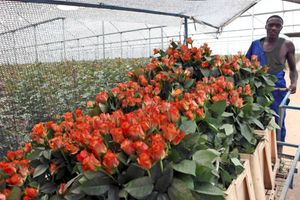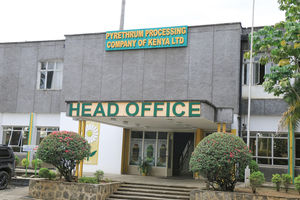
Chagema Kedera the Programme Coordinator-Technical Assistance, at the Committee Linking Entrepreneurship-Agriculture-Development.
The Kenyan New Export Trade (NExT) programme was launched in April 2020 to strengthen horticultural value chains by improving market access and raising food safety and quality. It has increased sustainability on socio-economic and environmental fronts and competitiveness of horticultural exports. Richard Maosi talks to Chagema Kedera – Programme Coordinator, Technical Assistance, Committee Linking Entrepreneurship – Agriculture-Development (COLEAD).
What are of aims of NExT?
Its overarching goal is to improve Kenya’s horticultural value chains, fostering increased employment, foreign exchange earnings, enhanced food security, food safety and nutrition.
The programme has reinforced Kenya’s position as a global player in horticultural exports, while addressing the evolving challenges in market demand. We provide regulatory frameworks, technical assistance, vocational training and support services in monitoring, market insights, partnerships, research, innovation and access to finance.
At the same time, our aim is to improve the capacity of the public sector to strengthen the competitiveness of produce that originates from Kenya and working with competent authorities.
NExT Kenya strives to meet the domestic, regional and international market standards, particularly those set by the European Union. We also advance sustainable practices that benefit producers and the environment.
How many beneficiaries have you reached in the last five years?
Through targeted interventions based on demand, COLEAD has worked closely with more than 180 beneficiaries, including small and medium-sized enterprises, service providers, government institutions and trade associations.
The objective is to strengthen their capacity to meet the stringent sanitary and phytosanitary (SPS) standards set by key markets, particularly the EU.
What are some of the achievements of the programme?
We have trained MSMES on good farming practices, food safety, plant protection, access to markets and market intelligence, business planning and access to finance. We show them how to comply with Sanitary and Phytosanitary Standards (SPS). This aids the Kenyan horticultural sector comply with the new EU plant health and food safety regulations covering pesticide residues and harmful organisms like false codling moth on roses and Maximum Residue Limit (MRL) issues, particularly on beans.
We support the implementation of efficacy and residue trials for the registration of plant protection products (PPPs). This helps control critical pests affecting fruits and vegetables.
We also develop industry-specific Good Practice Guides for key horticultural value chains, including avocado, beans and peas. These guidelines were prepared to inform stakeholders on how to address the SPS and commercial quality requirements.
More importantly the guides have been broken down and dissemination materials prepared to inform actors along the value chain. The training of trainers was meant to equip the industry with the required technical and training expertise on the GPGs content and support further roll out.
The National Horticulture Task Force (NHT) has been restructured as the National Horticulture Standing Committee (NHSC). Outline some of its functions?
The NHT was established to address challenges and emerging issues while synergising and optimising resources for the improvement of horticulture.
Support was provided for the secretariat and convening of meetings to address emerging issues.
A study to identify challenges affecting competitiveness of horticultural exports was carried out. It identified 122 bottlenecks. The top 47 have been rationalised to inform development of the horticulture masterplan.
Additionally, the NHSC is expected to offer support for trade missions to market destinations.
Have achieved climate change resilience?
We have by promoting sustainable practices, including using solar energy and waste-to-energy solutions to enhance environmental stewardship. We are involved in a pilot project that integrates digital sensors, solar powered weather stations and remote sensing technology with drip irrigation on an avocado farm in Kenya.
This is expected to optimise water and energy use, improve irrigation efficiency, yields and enhance climate resilience through sustainable farming.
We have supported companies to calculate their carbon footprint and how to manage it. There is also training of the industry stakeholders on energy management.
Is there targeted training for women and young people?
For inclusivity and real impact at grassroots, there is targeted training for women, youth and marginalised communities. This is expected to expand the talent pool in horticulture and foster equitable growth.
Early engagement ensures these groups fully benefit and become agents of change, securing sustainability even after the programme. The programme, for instance, is anchored on ICT involvement, with many women and young people allocated resources to be part of innovative agriculture.
Who do you work with?
COLEAD is working with the government, regulatory agencies, the Kenya Plant Health Inspectorate Service (Kephis), the Horticultural Crops Directorate, the Pest Control Products Board (PCPB) and the Kenya Agricultural and Livestock Research Organisation (Kalro). We have also engaged agriculture trade officers attached to Kenyan missions in Europe to share on the regulatory and quality requirements
Our other partners are horticulture producers, MSMEs, farmer cooperative societies, development partners and industry stakeholders, including exporters, buyers and NGOs.
These entities have enriched NExT Kenya with expertise and resources.
What challenges have you had?
From the time the programme was designed, the world has witnessed the Covid-19 pandemic, the Russia-Ukraine war and sea trade disruption, leading increased unemployment and reduced incomes. Regulatory evolution to main destination markets like Europe affects compliance and market access.
The other challenge is the direct impact of climate change, including pest and diseases management. This leads to food safety and plant health concerns. Data collection in horticulture and micro level remains a big problem too. In addition, many of those in the sector lack a suitable financial solutions.
Any lessons learnt?
Combining training, tools, policy dialogue and financing links is critical for coping with market uncertainties and climate variabilities.
Equipping local institutions with technical skills and sound governance fosters sustainability beyond donor support.
Steady collaboration between government agencies, exporters and donors multiplies programme reach, facilitating knowledge exchange, innovation and shared learning.
Open forums like the National Horticulture Standing Committee provide effective platforms for problem-solving and policy alignment.






